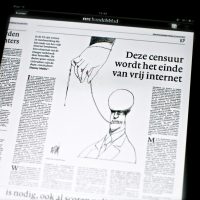In the USA, laws are in preparation that would mean the end of a free internet. The court of The Hague passed a verdict to the same effect. The culprits go unpunished and innocent internet users are the ones who suffer, Danny Mekic’ concludes.
What do Facebook, Google, Twitter, eBay and Wikipedia have in common?
In the United States, two disastrous bills risk being accepted — the Stop Online Piracy Act (SOPA) and the Preventing Real Online Threats to Economic Creativity and Theft of Intellectual Property Act (PIPA). If accepted, these bills would make it possible to have websites blocked, to confiscate a web address (such as google.com), to prohibit payment to websites (using e.g. Visa, Mastercard or Paypal), to have websites removed from search engines or to forbid advertisers from cooperating with a website.
Judges could impose these measures upon a website if it’s deemed to “facilitate copyright infringement”. That means it’s not required that the actual website owner would be infringing any copyrights. All it takes is for just one user — among hundreds of millions — to do so.
It’s exactly the successful open nature of the above websites — where the users generate the content — that puts them at risk of being blocked by this heavy-handed policy. The entire website would be targeted, as opposed to just the one page or photo that’s been published without the proper permissions. It would be like a gigantic flea market being completely shut down because there was one illegally copied CD somewhere. This is why Wikipedia and many other websites, which are now only required to remove actual copyright-infringing content, blacked out their websites in protest the previous week.
Meanwhile, in the Netherlands, a judge ruled that internet providers have to block The Pirate Bay — an online catalogue of references to films and music. If this verdict should pass appeal, that would open the door to internet censorship out of commercial interests. This will be the end of the internet as we know it. In this case, politics will need to intervene.
Western democracies that value civil rights must be able to guarantee uncensored access to information and freedom of communication — especially the Netherlands, the most important hub of European internet traffic.
This Dutch verdict limits free access to the internet, but doesn’t affect illegal websites themselves nor traders in illegally copied products. Innocent internet users suffer. The justification for this limitation of our constitutional rights is supposedly the “protection of copyrights”. It would supposedly make it possible to put a stop to internet downloading.
Would this be a desirable thing? Does downloading really hurt the music industry? The very opposite actually seems to be the case. Not only did 2011 see a record amount of moviegoers visiting the cinemas, but Dutch music exports increased for the sixth year in a row, this time increasing by 25% to 80 million euros. Never before has this much money been spent on concerts and festivals. Worldwide music revenue has increased from 60.7 billion to 66.4 billions dollars in recent years.
Various studies (SEO Economic Research, Institute for Information Law, TNO, 2009) indicate that people who download actually spend more money on music and films, not less. This is true not only for obscure artists. Renowned Dutch violinist André Rieu sold fifty thousand concert tickets the first time he visited Mexico. His previously unreleased albums furthermore attained first, fifth and ninth place in the top ten. People in Mexico already knew of his work — through the internet.
And still, the record industry — which once served an important purpose by manufacturing and distributing vinyl records — tries to limit the online music industry by holding back innovation (iTunes and Spotify are the only successful examples in ten years), shutting down initiatives with lawsuits, and using a powerful lobby. The far too expensive songs on iTunes, which can’t be used freely after purchasing, and the limited assortment of Spotify, which more and more record labels are abandoning, make the online consumer seem ridiculous with this decidedly immature legally available range.
Fortunately, home users download content legally in the Netherlands. Artists have made tens of millions of euros from our private copying levy in the last few years. In exchange for paying this levy, consumers are allowed to download music and films for home use. There’s a reason why State Secretary Teeven (Security and Justice, with the VVD party) received a petition in late 2011 from the artists’ unions, the consumer protection organisation Consumentenbond and the union FNV KIEM (Arts, Information, Entertainment and Media) against a ban on downloading and in favour of the preservation and expansion of this arrangement.
The Dutch blockade and the American bills put us on a slippery slope. Conflicts of commercial interests between third parties are leading to internet censorship and to the devaluation of our constitutional rights. It’s about copyright infringement now, but it’s to be expected that these laws and this jurisprudence will be extended in the future. This will lead to more and more internet censorship.
All of it at the expense of innocent customers. This is carried out by internet service providers who are given the task of playing internet police. The internet risks becoming slower, less stable and more expensive. Innovative start-ups and established companies will be less willing to invest in it.
Then there will be only one thing left to do for those who want to be free from wanton censorship — circumventing the blockades, and once this becomes impossible, creating a new, underground infrastructure, putting actual crime outside the reach of the law. This would be a highly undesirable development.

Leave a Reply